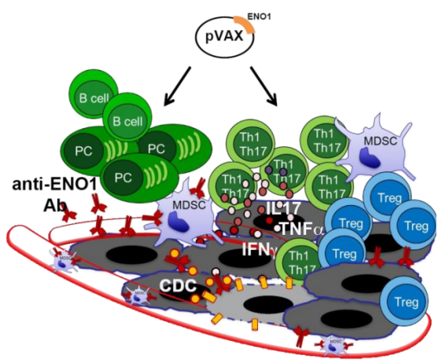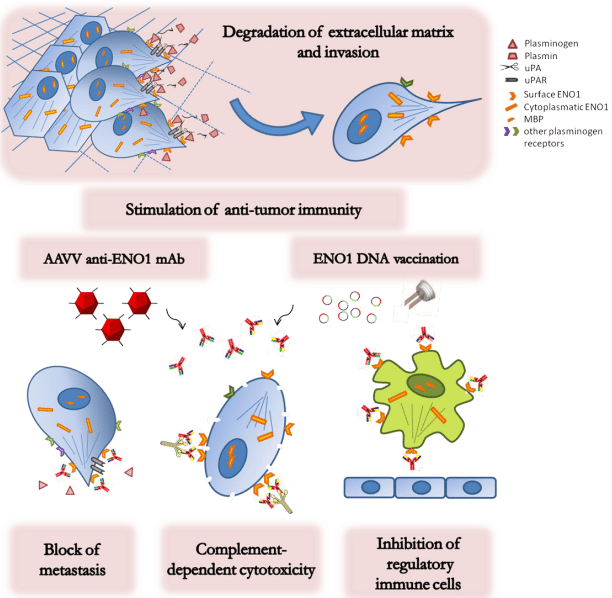NAA Services for Anti-ENOA1, 2 Antibody
Equipped with high-end technologies and Ph.D. level scientists, Creative Biolabs has long been a famous service provider in the field of natural autoantibodies (NAAs) development and immunotherapy. With years of experience, a series of innovative and diversified NAA platforms have been successfully developed to provide fast and convenient services for our worldwide customers. At present, we are able to provide a full range of anti-ENOA1, 2 marker services for disease diagnosis and therapeutic monitoring. Our professional team is optimized to help you get a milestone development in your NAA project.
Background of ENOA1, 2
Enolases are glycolytic enzymes responsible for the ATP-generated conversion of 2-phosphoglycerate to phosphoenolpyruvate. In mammals, there are three different enolase isoforms: alpha-, beta- and gamma-enolase, which can be abbreviated to ENOA1, 2, 3, respectively. Each is encoded by three distinct genes and expressed in a tissue and development-specific manner. ENOA2 is a phosphopyruvate hydratase. ENOA1 is a metabolic enzyme that is important for glycolysis. It is expressed on the cell surface where it acts as a receptor for plasminogen. In tumor cells, ENOA1 is upregulated and activated by several glucose transporters and glycolytic enzymes that contribute to the Warburg effect. ENOA1 glycolytic activity is strongly associated with increased ATP citrate lyase expression in gliomas, thus ENOA1 may act as a metabolic tumor promoter conferring a selective growth advantage onto ENOA1-overexpressing tumor cells.
 Fig.1 Alpha-enolase (ENO1) DNA vaccination effects in pancreatic ductal adenocarcinoma (PDA)
mouse model. (Cappello, et al., 2018)
Fig.1 Alpha-enolase (ENO1) DNA vaccination effects in pancreatic ductal adenocarcinoma (PDA)
mouse model. (Cappello, et al., 2018)
The Role of Anti-ENOA1, 2 Antibody in Pancreatic Cancer
Pancreatic ductal adenocarcinoma (PDAC), an exocrine tumor, is the most common type of pancreatic cancer (PC). Its microenvironment is characterized by a strong desmoplastic reaction associated with significant infiltration of T regulatory lymphocytes and myeloid-derived suppressor cells. Most patients die within 12 months and only 4% survive for five years after diagnosis. ENOA is also expressed on the surface of many cell types including PDAC where it acts as a plasminogen receptor. It is, therefore, a suitable target for anti-ENOA1, 2 IgG antibodies, which efficiently trigger antibody or complement-dependent cytotoxicity. In addition, as cancer progression is often associated with the ability to escape immune responses, the association of autoantibody production with a favorable clinical course may reflect a more efficient immune response in ENOA1, 2 PDAC patients. It was demonstrated that anti-ENOA1, 2 antibodies usefully complement the diagnostic performance, achieving approximately 95% diagnostic accuracy in both advanced and resectable PDAC. The presence of ENOA-specific CD4+ T cells suggests the existence of anti-ENOA-antibody-producing B cells. In addition, the overexpression of this enzyme may promote the overcoming of immune tolerance, and often results in autoantibody production. Notably, ENOA has been suggested as a potential biomarker of pancreatic cancer.
 Fig.2 Multiple immunotherapeutic pathways targeting ENO1 antibodies.2
Fig.2 Multiple immunotherapeutic pathways targeting ENO1 antibodies.2
What We Can Do About NAA?
A substantial proportion of circulating antibodies in healthy individuals exhibits self-reactivity. These antibodies referred to as NAAs. After years of exploration, now, we are proud to introduce our innovated NAA services, ranging from NAA detection, NAA profiling, to NAA epitope mapping. A wide spectrum of NAA products is available for your choice.
Features of Our Services
- One-stop pipeline to save your time and energy
- High efficiency and high accuracy without large-scale repeats
- Best after-sale service to reduce your worries behind
At Creative Biolabs, we provide the largest and diversiform portfolio of NAA products and services. Our proven and optimized platforms can help you quickly get satisfactory results without repeated trials. Our service can be designed to meet your special needs if you have any requirements. If you are interested in our service, please contact us by e-mail and our team will get back to you as soon as possible.
References
- Cappello, Paola, et al. "Next generation immunotherapy for pancreatic cancer: DNA vaccination is seeking new combo partners." Cancers 10.2 (2018): 51.
- Principe, Moitza, Paola Cappello, and Francesco Novelli. "Blockade of Surface Alpha-Enolase (ENO1) as a Novel Immunotherapeutic Approach in Pancreatic Cancer." BIOMEDICAL JOURNAL (2016): 1-3.
Related Services:
- NAA Services for Anti-Calcium and Integrin Binding 1 (CIB1) Protein
- NAA Services for Anti-Coactosin-Like Protein (CLP)
- NAA Services for Anti-Mesothelin Antibody
- NAA Services for Anti-Ezrin

